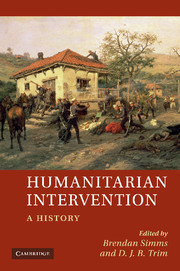Book contents
- Frontmatter
- Contents
- List of maps
- Notes on contributors
- Acknowledgements
- List of abbreviations
- 1 Towards a history of humanitarian intervention
- Part I Early modern precedents
- Part II The Great Powers and the Ottoman Empire
- 5 ‘From an umpire to a competitor’: Castlereagh, Canning and the issue of international intervention in the wake of the Napoleonic Wars
- 6 Intervening in the Jewish question, 1840–1878
- 7 The ‘principles of humanity’ and the European powers' intervention in Ottoman Lebanon and Syria in 1860–1861
- 8 The guarantees of humanity: the Concert of Europe and the origins of the Russo–Ottoman War of 1877
- 9 The European powers' intervention in Macedonia, 1903–1908: an instance of humanitarian intervention?
- Part III Intervening in Africa
- Part IV Non-European states
- Part V Postscript
- Index
8 - The guarantees of humanity: the Concert of Europe and the origins of the Russo–Ottoman War of 1877
Published online by Cambridge University Press: 18 April 2011
- Frontmatter
- Contents
- List of maps
- Notes on contributors
- Acknowledgements
- List of abbreviations
- 1 Towards a history of humanitarian intervention
- Part I Early modern precedents
- Part II The Great Powers and the Ottoman Empire
- 5 ‘From an umpire to a competitor’: Castlereagh, Canning and the issue of international intervention in the wake of the Napoleonic Wars
- 6 Intervening in the Jewish question, 1840–1878
- 7 The ‘principles of humanity’ and the European powers' intervention in Ottoman Lebanon and Syria in 1860–1861
- 8 The guarantees of humanity: the Concert of Europe and the origins of the Russo–Ottoman War of 1877
- 9 The European powers' intervention in Macedonia, 1903–1908: an instance of humanitarian intervention?
- Part III Intervening in Africa
- Part IV Non-European states
- Part V Postscript
- Index
Summary
If the Powers want serious results they must agree that the independence and integrity of Turkey should be subordinated to the guarantees demanded by humanity, Christian Europe, and interests of peace.
Prince Gorchakov in conversation with Lord Loftus, 20 Nov. 1876The Eastern crisis from 1875 to 1878 represented a turning point in the history of the Ottoman Empire and a major challenge to the Concert of Great Powers. Beginning like one of the episodic rebellions against Ottoman rule, a peasant revolt in the Herzegovina in July 1875 spread to Bosnia in January 1876 before spilling over to Bulgaria in late April, and Serbia and Montenegro, which declared war against Sultan Murad V in June/July 1876. The events caught the attention of diplomats and became a major issue in the press mainly because of the brutality with which irregular forces, the Bashi-Bazouks, commanded by Ottoman officers, crushed the Bulgarian insurgency. According to contemporary investigators, the Turks killed between 12,000 and 15,000 Christians, yet Bulgarian historians claim that between 30,000 and 60,000 must have perished in the massacres. Whereas the powers intervened diplomatically at an early stage, the failure collectively to persuade the Ottoman government to implement reforms in the provinces led to the Russo-Turkish war in April 1877 which liberated the majority of the Balkan Christians.
What role, if any, did humanitarian motives play in the outbreak of the Russo-Turkish War in April 1877? Could it be understood as a humanitarian intervention?
- Type
- Chapter
- Information
- Humanitarian InterventionA History, pp. 184 - 204Publisher: Cambridge University PressPrint publication year: 2011
- 3
- Cited by



